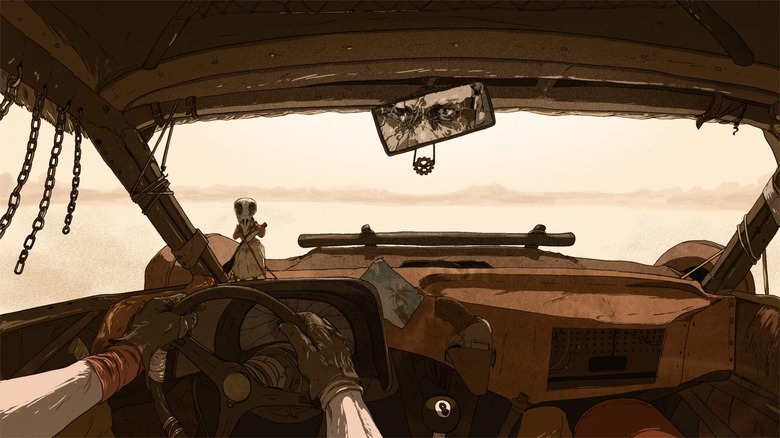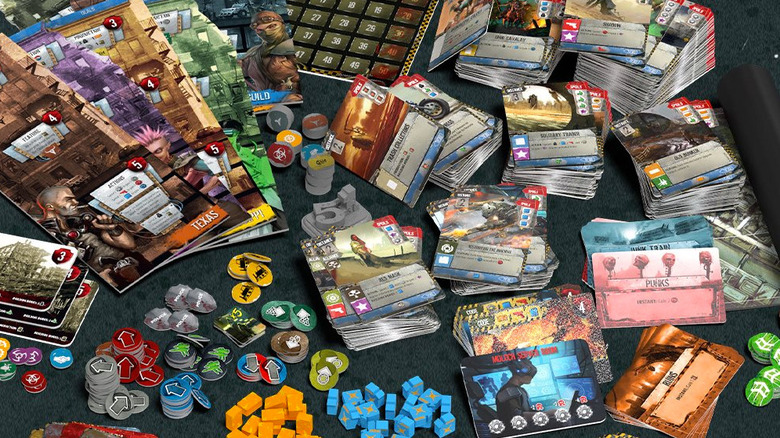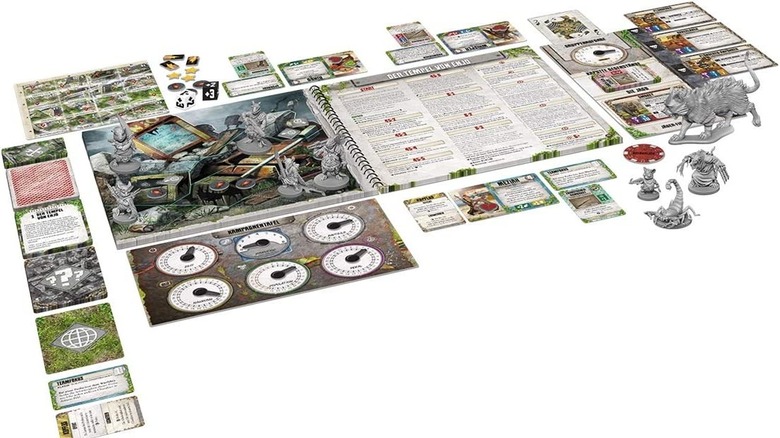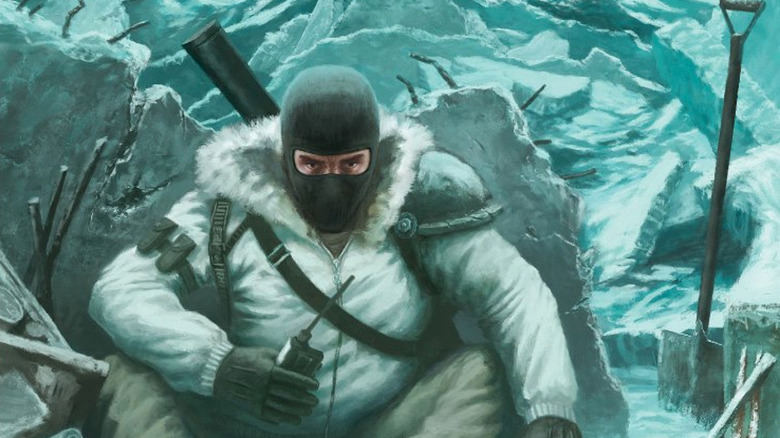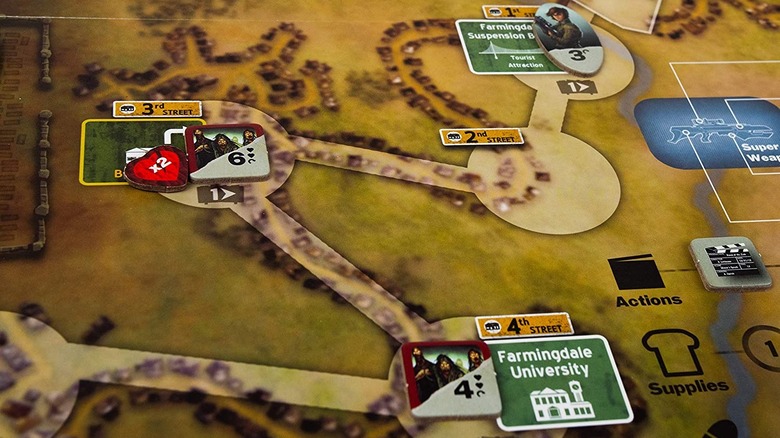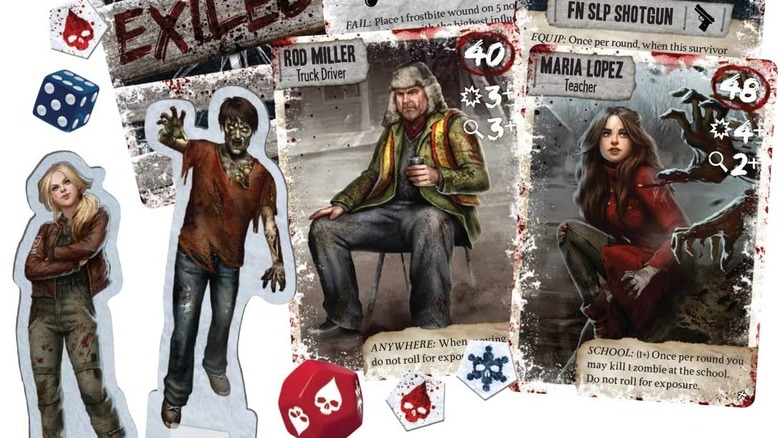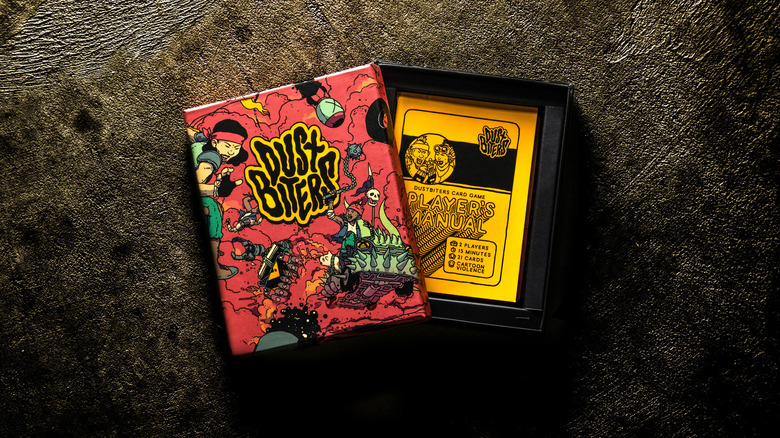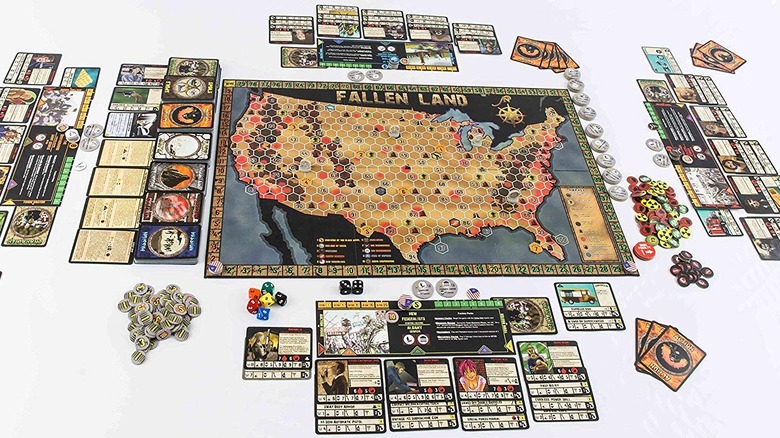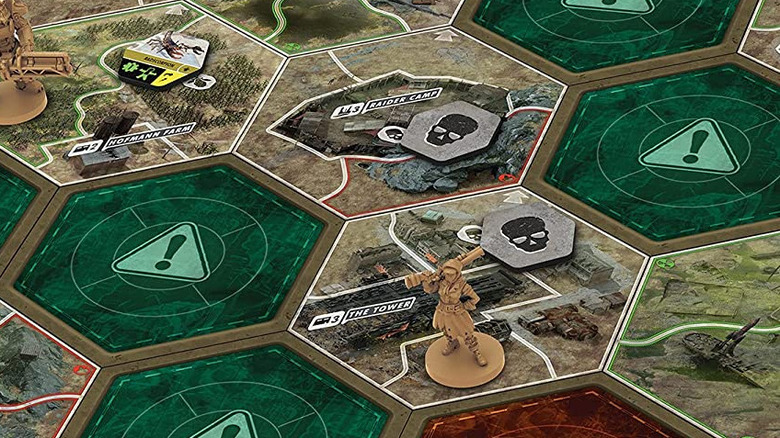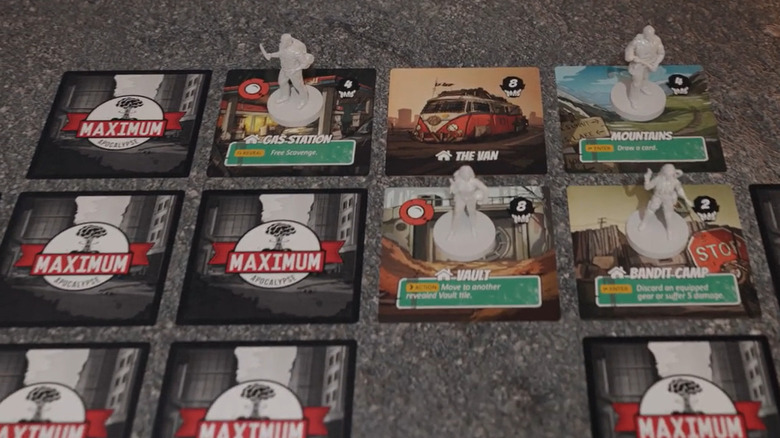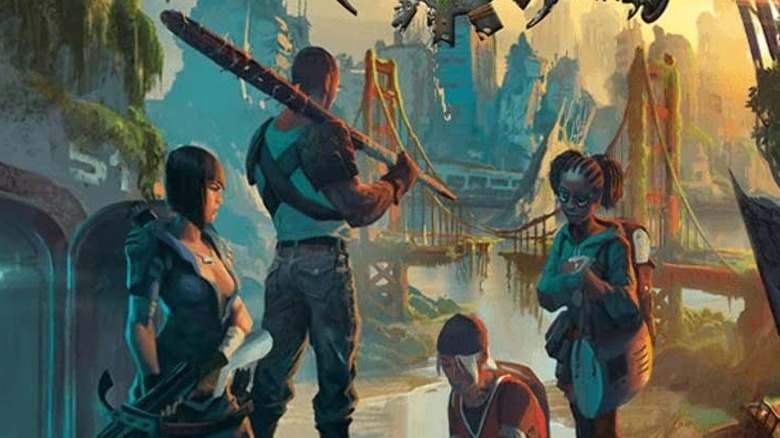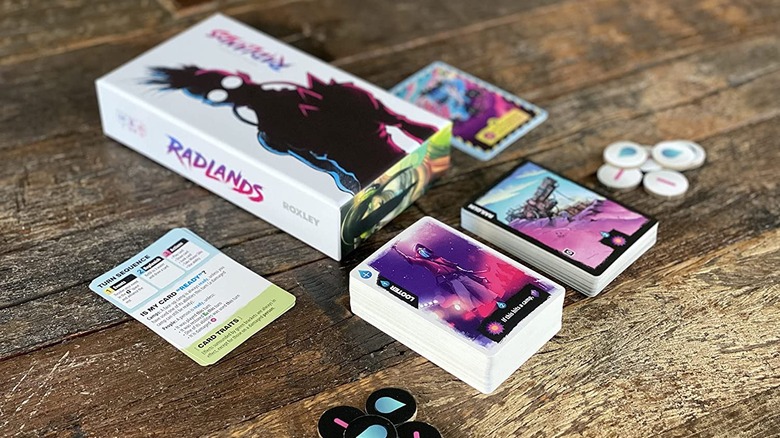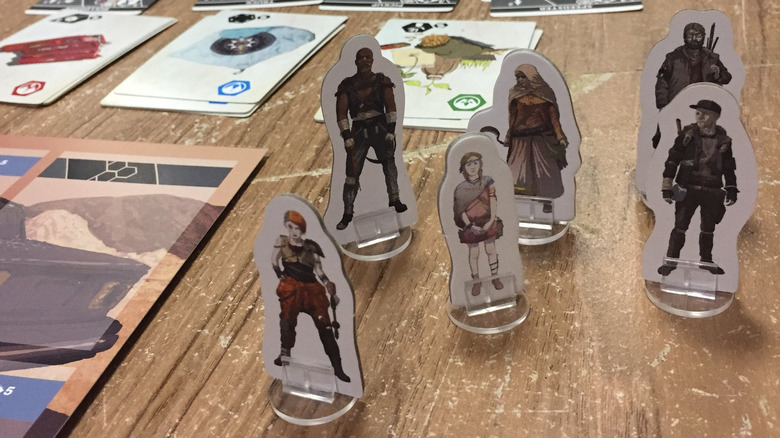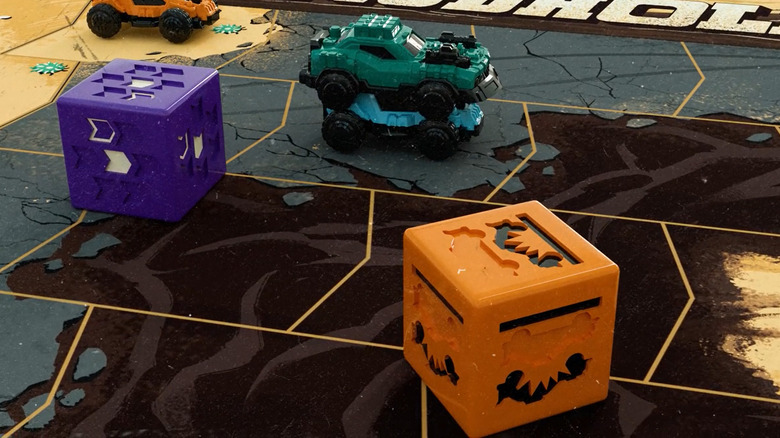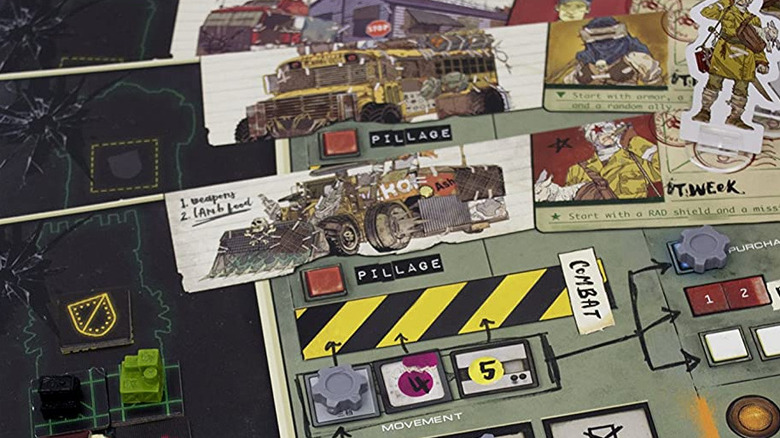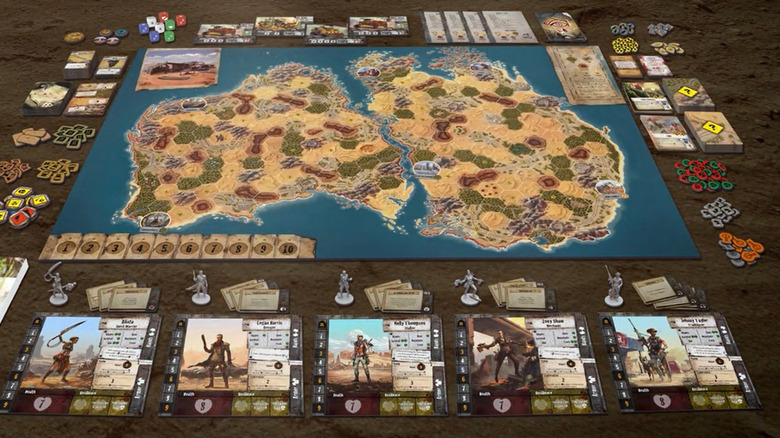The 15 Best Post-Apocalyptic Board Games
I've always liked to go through — not around — the things that stress me out. Nowhere is this more evident than in my growing collection of post-apocalyptic board games. With water shortages and record heat scorching our country, any sane person would look for comfort instead of more of the same, but as the famed road warrior Max Rockatansky once said, it's getting hard to know who is crazier, me or everyone else.
So consider this my recruitment message! Thanks to the sudden boom of zombie board games earlier in the century, the current state of post-apocalyptic board games is thriving. From storybooks to worker placement games to full-fledged RPGs, these are some of the best post-apocalyptic board games available to help you manage your doomsday anxiety. Some are a perfect fit for large groups. Others will give you an excuse to stay home alone the next time your friends invite you out for the weekend.
While many of these lists offer a deluge of zombie titles, I've done my best to be restrained. Yes, you'll find standouts like "Dead of Winter" and "Dawn of the Zeds" among the entries, but I think we could all use a little break from the undead hordes. So from windsails to snowstorms to blatant "Waterworld" riffs, this list is designed to bring you every flavor of the apocalypse. Now, good luck to you and your ragtag group of survivors, and remember, out here, everything hurts.
51st State
For many game developers, creating a post-apocalyptic board game means paying thinly-veiled homage to the "Mad Max" series, but what about the games that want to aim higher and bring the wasteland to an entire continent? In "51st State," players pick one of four factions, New York, the Mutants Union, the Merchants Guild, or the Appalachian Federation, and compete to bring back America in the form of the (you guessed it) 51st state.
The core mechanic behind "51st State" is the game's multi-use location system. Each turn, players gather resources from the faction board and the locations in front of them. They can then use those resources to visit, build, or raze a spot on the map. The more location cards you put out, the better prepared you are for when an opponent makes their move. When one player finally crosses the 25-point threshold, the game ends, and everyone measures the influence of their state to determine a winner.
Ten-plus years later, the original "51st State" is considered a classic by many gamers (albeit a classic with a complex collection of expansions and add-ons). Thankfully, Portal Games recognized the need for a refresh, putting an "Ultimate Edition" of the game on Gamefound earlier this year. This new version combines the various add-ons, introduces a few new expansions, and gives the entire system a fresh new coat of paint. If you want to rebuild civilization from the comfort of your dining room table, this game is for you.
Aftermath
Few game mechanics capture my interest like a good storybook. While many games in my collection were chosen for their replayability, my love of stories means I will always give precedence to a campaign-based game with a beginning, middle, and end. So a game like "Aftermath" — which, like "Gloomhaven: Jaws of the Lion," uses a spiralbound notebook as its game board and script — is of immediate interest to me. Bring on the miniature apocalypse.
In the wake of humanity's sudden disappearance, nature has begun to reclaim our ruins. In "Aftermath," you and your friends play as a group of small rodents scavenging for supplies in a decaying metropolis. Using the main storybook as your guide, you will travel between locations, triggering unique encounters and fighting rival parties — and sometimes enormous creatures hunting you as prey. With 20-plus missions and side missions to complete, "Aftermath" is the perfect midsized game for those looking to add a little bit of worldbuilding to their next game night.
Unlike most campaign games, "Aftermath" allows for communication between the players and the would-be enemies. Each situation is designated as either safe or hostile, and the safe condition will enable players to attempt to communicate with enemy figures on the map. Succeed, and you'll defeat an NPC and remove a threat card from the deck. For a grizzled RPG veteran like myself, who prefers to persuade characters rather than fight them, this mechanic promises to add a nice variety to the encounters.
Arctic Scavengers
Full disclosure: It's been years (years) since I played a game of "Arctic Scavengers," but it was a great introduction to the world of post-apocalyptic tabletop. The year is 2097, and humanity is on the brink of collapse after a climate catastrophe. This bleak premise gives "Arctic Scavenger" a somewhat unique theme, even among this assorted mix of nuclear disasters and global pandemics. Most ecological disasters seem to happen in the dead of summer, but why not show a little love for the horrors of endless winter, too?
Each round of "Arctic Scavengers" plays out over three phases. In the first phase, players draw cards from the top of their deck. In the second phase, players gather resources and announce the number of cards they hold for the skirmish. Finally, in the skirmish phase, the fight totals of all held cards are counted, and the winner takes the top contested resource. Once the skirmish is over, the players start a new round, continuing until the last contested resource card has been claimed.
Like all deck-builders, each player starts "Arctic Scavengers" with the same hand, but what you choose to do with those resources matters. Players can spend their time scavenging or fighting, and the only true barometer for success is the size of your tribe. Make smart choices with your cards — and replace the weak cards with their improvements — and you might scrounge enough supplies to make it through the endless winter.
Dawn of the Zeds
While "Night of the Living Dead" launched the zombie genre, "Dawn of the Dead" established some of its most important themes. Sure, it's all fun and games when lighting up a few stragglers, but the longer you survive, the bigger and more dangerous the horde becomes. No game promises to capture that better than "Dawn of the Zeds."
Walking a fine line between a wargame and a tower defense system, "Dawn of the Zeds" situates you in the crosshairs of a zombie horde. You and a ragtag group of heroes are making your last stand in the small town of Farmingdale, but with each passing wave of zombies, your chances at survival dim. To have any shot at escape or a cure, you must manage your resource boards, keep your infections to a minimum, and put a wall of soldiers between you and the advancing hordes.
While "Dawn of the Zeds" is technically a multiplayer game, every board game resource I could find firmly pointed to the single-player version as the definitive experience. This is in keeping with the other lane-defense games published by Victory Points Games in their States of Siege series. From World War I to the English Civil War, these mechanically aligned titles present players with a grueling battle against the clock and their enemies. "Dawn of the Zeds" might be the most populist title in the series, but it's just as challenging and even more narratively satisfying.
Dead of Winter
As someone introduced to board games with "Battlestar Galactica," I've always had a soft spot for collaborative games with a hidden role mechanic. From "The Thing" to "Unfathomable," I will always be drawn to games that allow you to royally screw over your friends while offering the loudest possible protestations of your innocence. So when I discovered "Dead of Winter" early in the hobby, I knew that this would be a game I would cherish for life.
In "Dead of Winter," you and your friends take on the role of survivors in a post-apocalyptic breakdown. With supplies running out and a horde of zombies knocking at your door, you must work together to overcome challenges and manage your meager resources. While your group may seem to be working towards a shared outcome, each player also draws their secret objective, putting the group's needs in tension — and sometimes outright conflict — with the needs of the individual.
"Dead of Winter" was the first in publisher Plaid Hat Games' "Crossroads" series, since joined by the sci-fi thriller "Gen7" and the pirate-themed "Forgotten Waters." Each game captures the conflict between the individual and the community. Do you do what's right for your neighbors, even if it pushes your own goals that much further away? Like all great post-apocalyptic fiction, the notion of rugged individualism retains its bite almost a decade later — zombie pun fully intended, of course.
Dustbiters
"On the outskirts of civilization, two rival gangs are locked in a deadly car chase as they bid to outrun the unrelenting dust storm." These are the opening words of "Dustbiters," a two-player card game pitting man against man and nature. The entire game feels like an exploration of the storm scene from "Mad Max: Fury Road" in which two convoys clash in the wake of a global storm. If that's not a good idea for a post-apocalyptic board game, I don't know what is.
The rules for "Dustbiters" are almost shockingly simple. After each player contributes to the convoy — four cars in front, four in the back — you will spend your turn performing four actions. You can add vehicles to the front of the convey, move existing cars up in the order, add cards to your hand from the draw deck, or use the unique powers described on each vehicle. Players spend each round jockeying for position, but at the end of a turn, whatever car brings up the rear is swept off the board by the dust storm.
With memorable artwork from designer Terri Vellman and a modest price point (the game is $20 on the iam8bit website), "Dustbiters" is a winning combination of simple and stylish. It feels like the perfect airport game for people who want to be economical with their space but are unafraid to share their nerdiness with complete strangers. Hell, I'm sold. I bought my second edition copy halfway through this write-up.
Fallen Land: A Post-Apoclayptic Board Game
With so many different ways to play out the apocalypse, it should come as no surprise that at least one designer found inspiration from an old-fashioned base builder. In "Fallen Lands: A Post-Apocalyptic Board Game," players take on the role of different factions vying for control of America after the infamous Great War. You will create parties of characters and explore what remains of North America in search of resources to build your empire.
Many games may position themselves as an RPG in a box, but few games deliver like "Fallen Land." From encounter decks to skill checks to a shockingly enormous game map, you might be able to sustain a campaign in "Fallen Land" until the real apocalypse hits. This kind of game requires you to manage seven (!) different decks of player cards, ranging from characters to items to various actions and encounters your faction can undertake. It's a lot, but it promises to be immersive as hell.
Early in the rulebook, the designers describe "Fallen Land" as a game with "strong pulp" influences but roots in Cold War studies, so it's not a surprise that the game makes no apologies for the number of components it asks you to manage. Like so many titles on this list, "Fallen Land" is in the aftermath of a successful Kickstarter campaign for a second edition, offering fans of apocalyptic tabletop an update for their next round of atomic warfare.
Fallout + Fallout: Atomic Bonds
I don't think of myself as a franchise guy, but my tabletop collection tells another story. With copies of "Fallout," "Fallout Shelter," and "Fallout: The Roleplaying Game" occupying my shelf, it's clear I like my post-nuclear wastelands with a side of retro-consumerism. Thanks to a well-placed expansion, "Fallout: Atomic Bonds," a board game that was once widely acknowledged as broken has been given a shot at redemption. "Fallout" now delivers on the promise present in the base game.
Even without "Atomic Bonds," there's a lot to like about the original "Fallout" game. Nobody squeezes better production design out of a license than the team at Fantasy Flight, and many elements of the game, from equipment to the quest deck, make you feel right at home as a vault dweller emerging into the apocalypse. Still, any praise of the game must come with two catastrophic caveats: The endgame scenario is an arbitrary mess, and the multiplayer turns a collaborative premise into a competitive flop.
Thankfully, "Atomic Bonds" offers solutions for both of those problems. With new endgame scenarios and tweaks to the combat system that allow multiple characters to shoot away at enemies, "Fallout" is now the collaborative wasteland experience it was always meant to be. With a reasonable price point attached to the expansion ("Atomic Bonds" costs $15 or less at most online retailers) the game collecting dust on my shelf has been bumped to the front of the line.
The Maximum Apocalypse Series
Sure, dungeon crawlers are fun, but have you ever gotten addicted to an utterly brutal roguelike? These randomized encounter-based games, often laced with the threat of permanent death, offer a combination of high replay value and compact storytelling. And at least in the case of "Maximum Apocalypse," a homebrewed, apocalyptic board game has transformed one publisher into a miniature tabletop empire. Stick that in your pipe and smoke it, "Elden Ring" and "Slay the Spire."
With various disasters to choose from, including zombies, aliens, and the all-too-real robot revolution, "Maximum Apocalypse" promises a unique experience every time. Players begin by picking a mission and randomizing the board tiles. Then, through the smart use of survivors, gear, and instant effects, you and your partners will work together to find the hidden locations, complete the mission, and emerge from the board intact before the zombie-alien-robots add your bones to the wasteland.
A true labor of love (publisher Rock Manor Games' website makes it clear that this is a one-person show), "Maximum Apocalypse" promises a modular roguelike for anyone who likes the idea of Legendary Encounters games but bristles at the notion of corporate IPs. For those who want to bring their "Maximum Apocalypse" experience to the next level, Rock Manor is also working on a standalone expansion, "Wasted Wilds," and a complete roleplaying game based on the mechanics of the original. Truly, we have reached maximum apocalypse for everyone.
Outlive
It takes a lot for me to like a worker placement game. While many games present players with complex puzzles built around tough decision-making, these titles are often strong on strategy and light on theme. I need more than a series of brown cubes and yellow squares. I need to know that my choices come with stakes. Thankfully, games like "Outlive" prove that worker placement and post-apocalyptic themes are a match made in nuclear heaven.
The year is 2079, and humanity has been reduced to an estimated 30,000 survivors in the wake of a devastating war. To survive, each tribe must compete for the attention of the Convoy, a mysterious organization hunting for the strongest survivors to bring into their post-apocalyptic utopia. However, if you can manage your supplies, add new modules to your shelter, and keep the irradiation from killing everyone you love, you might escape this wasteland hellhole once and for all.
Fans of video games like "This War of Mine" and "Fallout Shelter" will find a kindred spirit in "Outlive," which uses a combination of worker placement and resource gathering to build out bigger and more robust colonies. The competitive element of "Outlive" comes from the ruined cities surrounding you, where players will choose heroes to collect resources and jockey for power among the tribes. It's a lot of moving parts, but if you're someone who likes your technology trees with a little atomic flavor, "Outlive" is the game for you.
Radlands
I've often said that "Radlands" is the card game that ruined all other card games for me, so where better to sing its praises yet again than this list of post-apocalyptic games? Unapologetically neon — and impossibly fun — the game accomplishes the impossible feat of being both swingy and remarkably balanced. No matter your strategy, you always feel like a single turn away from victory and defeat. "Radlands" is one hell of a drug.
In "Radlands," you are tasked with defending three camps in your territory. The general premise is a lane-battling game. If you can muscle your way through enemy columns and into the heart of their bases, you and your tribe of maniacs will emerge victorious. With water scarce and recruits hard to come by, you are often faced with a tough choice: Do you try the aggressive play and leave yourself exposed in subsequent rounds, or do you play conservatively and let your opponent ready themselves for a big swing?
"Radlands" was designed by a former "Magic: The Gathering" creative, and it isn't hard to see the shared DNA between the two games. Characters enter tapped, and players are often forced to choose between their offensive and defensive values in any given turn. While "Radlands" characters can eliminate vast swaths of their enemies or even nuke the board entirely, the precise calibration of cost to effect makes it one of the tensest gameplay experiences I've ever had.
Saltlands
What if the crew from "Mad Max: Fury Road" abandoned their quest for the green place and drove off into the salt? How would things have gone for Furiosa and company if they were forced to navigate mile after mile of open terrain? That's the central premise of "Saltlands," a tile-based board game that sees you chasing rumors of civilization in a dusty wasteland. Take a wrong turn — or misread the direction of the wind — and your bleached corpse may be the only evidence that you once called this desert home.
In "Saltlands," you and your friends hunt for a mythical escape from the desert as a horde of raiders descends upon the wasteland. Each turn, players take the standard assortment of actions (move, trade, use their character's unique ability, etc.) to inch closer to the promised land. Finally, if players can collect enough rumors, those markers allow them to escape, leaving their opponents behind to face down the violent horde and their cruel god (which is to say, they lose).
Like the other titles on this list, "Saltlands" uses the post-apocalyptic wasteland as a backdrop for interesting new game mechanics. Here, that mechanic is the wind. Many of the vehicles found in "Saltlands" use makeshift sails to operate, and players must always be aware of wind direction – and strength when determining their mobility. This mechanic adds a layer of uncertainty to character movement, forcing you to react to the environment, not just the other way around.
Thunder Road: Vendetta
If one man's trash is another man's treasure, no company has a better business model than Restoration Games. The popular board game publisher has built a cardboard empire out of recycling the mechanics of long-forgotten titles, leading to some of the most successful Kickstarter campaigns of the past few years. With "Thunder Road: Vendetta," Restoration is breathing life back into Milton Bradley's 1986 "Mad Max" spinoff of (mostly) the same name.
In this new release, each player takes control of a crew of three cars in a deadly post-apocalyptic race. Players roll their movement dice each turn and assign different values to their three command boards. Your goal is to avoid hazardous terrain and the guns of your opponents while doing your best to run your enemies off the road. If you're the first to cross the finish line — or if all other vehicles on the map are rendered inoperable — you and your interceptor emerge victorious.
After wrapping a successful crowdfunding campaign in February, the Restoration team has been hard at work bringing the game (and its handful of planned expansions) to board game shelves worldwide. While every fulfillment process is something of a question mark these days, "Thunder Road" still seems on track for a late 2022 delivery. So if you missed your chance at backing the game, keep an eye on your friendly local game store and cross your fingers that you can pick up your copy soon.
Wasteland Express Delivery Service
Apocalypses typically come in one of two flavors. On the one hand, you've got your sepia-toned showcases of human suffering (think John Hillcoat's adaptation of "The Road") and on the other, the wacky apocalypse found in films like "Radioactive Dreams" and "Waterworld," So if the name "Wasteland Express Delivery Service" didn't tip you off, the rulebook opens with a sprawling introduction from a character named Dispatch ("both my name and occupation"). Yeah, that's the goofball good stuff.
In "Wasteland Express Delivery Service," you and your opponents play as rival delivery drivers at the world's end. As you zip around the hexagonal map, you battle raiders, purchase and deliver cargo, and keep an eye on the ever-shifting marketplace for supplies (water, weapons, and food). Winning the game means being the first to deliver a set amount of priority cargo, but be wise: You may want to upgrade your vehicle before heading into the wasteland's heart.
There are many great examples of how "Wasteland Express" marries theme and gameplay, but one of my favorites is the cargo deliveries. The game makes it clear that you cannot deliver cargo to the same outpost twice in a row, but rather than leave that as a purely mechanical decision, the designers ground this requirement in the narrative. "You struck a good bargain — and you were kind of a d***," the rulebook explains. It's a great example of how the best post-apocalyptic games can bleed fun.
Waste Knights
Every game on this list offers some flavor of the apocalypse, but if your goal is to recreate the "Mad Max" experience as faithfully as possible, then "Waste Knights" is the game for you. Set in Australia, "Waste Knight" puts you in the shoes of grizzled survivors such as Logan Harris, the Avenger, or Zoey Shaw, the Mechanic as you fight through a handful of immersive plot points.
Billed as a scenario-based board game, "Waste Knights" offers the whole RPG experience for lovers of the apocalypse. Players take on the role of the titular knights( and their trusty vehicles) to move around a map of new Australia, completing the adventures outlined in the guidebook and the expansive "Book of Tales." While it's hard to pin down an exact runtime, the developers have noted that a single scenario can encompass "around 80 pages of text." Like any RPG, how much you dig into the experience depends on your diligence with side quests and branching story arcs.
Perhaps my favorite thing about the "Waste Knights" franchise is their most-recent sequel. "Beyond the Horizon" is the latest expansion to get funded on Kickstarter. This new game trades the empty desert for the open ocean, tapping into our growing appreciation for "Waterworld" with an aquatic adventure. With several new heroes and a whole fleet of boats to choose from, "Beyond the Horizon" shows ambition on the part of the publishers that deserves our admiration.
